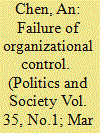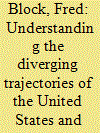| Srl | Item |
| 1 |
ID:
077224


|
|
|
|
|
| Publication |
2007.
|
| Summary/Abstract |
In the 1990s, Bolivia's indigenous population mobilized to claim new political roles, and in the process, directly challenged the privileged position of economic elites within national political institutions. In response, business associations in Santa Cruz, Bolivia's most prosperous region, began to demand regional autonomy-in contrast to the demand for authoritarianism that characterized prior generations of business elites when confronted with threatening political change. After examining Santa Cruz' past relationship with the national government, this article explores the challenges that led economic elites in the department to seek autonomy and the strategies that they have adopted in pursuit of this goal.
|
|
|
|
|
|
|
|
|
|
|
|
|
|
|
|
| 2 |
ID:
077223


|
|
|
|
|
| Publication |
2007.
|
| Summary/Abstract |
Emerging forms of empowered participatory governance have generated considerable scholarly excitement, but critics continue to ask if such initiatives are "for real": Are participatory governance processes sufficiently independent? Do citizen participants make good policy choices? An in-depth look at the case of the British Columbia Citizens' Assembly on Electoral Reform suggests that real citizen empowerment depends on both the institutional constraints of the participa-tory setting and how citizen interests and arguments for policy outcomes crystallize over the course of a participatory process
|
|
|
|
|
|
|
|
|
|
|
|
|
|
|
|
| 3 |
ID:
077226


|
|
|
|
|
| Publication |
2007.
|
| Summary/Abstract |
As frequent, violent, and organized peasant protests show, China's reform regime has lost its once all-powerful control in the countryside. The sharp decline of village cadres' positional authority in allocating economic resources, which began in post-Mao decollectivization, holds the key to explaining the change. Since the late 1990s, the collapse of village enterprises and the erosion of power over land have cost village cadres their remaining economic levers to engage the villagers as well as their incentives to work for the party-state. The loss of the regime's grip on village cadres and the loss of command by village cadres on peasants have almost synchronized, causing the traditional structure of organizational control to crumble in vast rural areas. In the new, prevailing patterns of village governance, party power is becoming increasingly irrelevant
|
|
|
|
|
|
|
|
|
|
|
|
|
|
|
|
| 4 |
ID:
077225


|
|
|
|
|
| Publication |
2007.
|
| Summary/Abstract |
Through a comparative, longitudinal analysis of the wine industry in two Argentine provinces, this article finds that different political approaches to reform and not simply socioeconomic endowments determine the ability of societies to build new institutions for economic upgrading. A "depoliticization" approach emphasizes the imposition of arm's-length incentives by a powerful, insulated government but exacerbates social fragmentation and impedes upgrading. A "participatory restructuring" approach promotes the creation and maintenance of new public-private institutions for upgrading via rules of inclusive membership and multiparty, deliberative governance. This latter approach can facilitate collaboration and knowledge creation among the government and previously isolated, even antagonistic, stakeholder groups.
|
|
|
|
|
|
|
|
|
|
|
|
|
|
|
|
| 5 |
ID:
077222


|
|
|
|
|
| Publication |
2007.
|
| Summary/Abstract |
This article proposes a neo-Polanyian theoretical framework for understanding the dynamics within contemporary market societies. It uses this framework to analyze the divergence between the United States and other developed societies that has become more pronounced in the first years of the twenty-first century. The argument emphasizes the shifting political alliances of the business community in the United States and suggests that from 1994 onward, business lost power in the right-wing coalition to its religious Right allies. The growing power of a religious-based social movement is a critical ingredient in the unilateralist turn in the Bush Administration's foreign policy
|
|
|
|
|
|
|
|
|
|
|
|
|
|
|
|